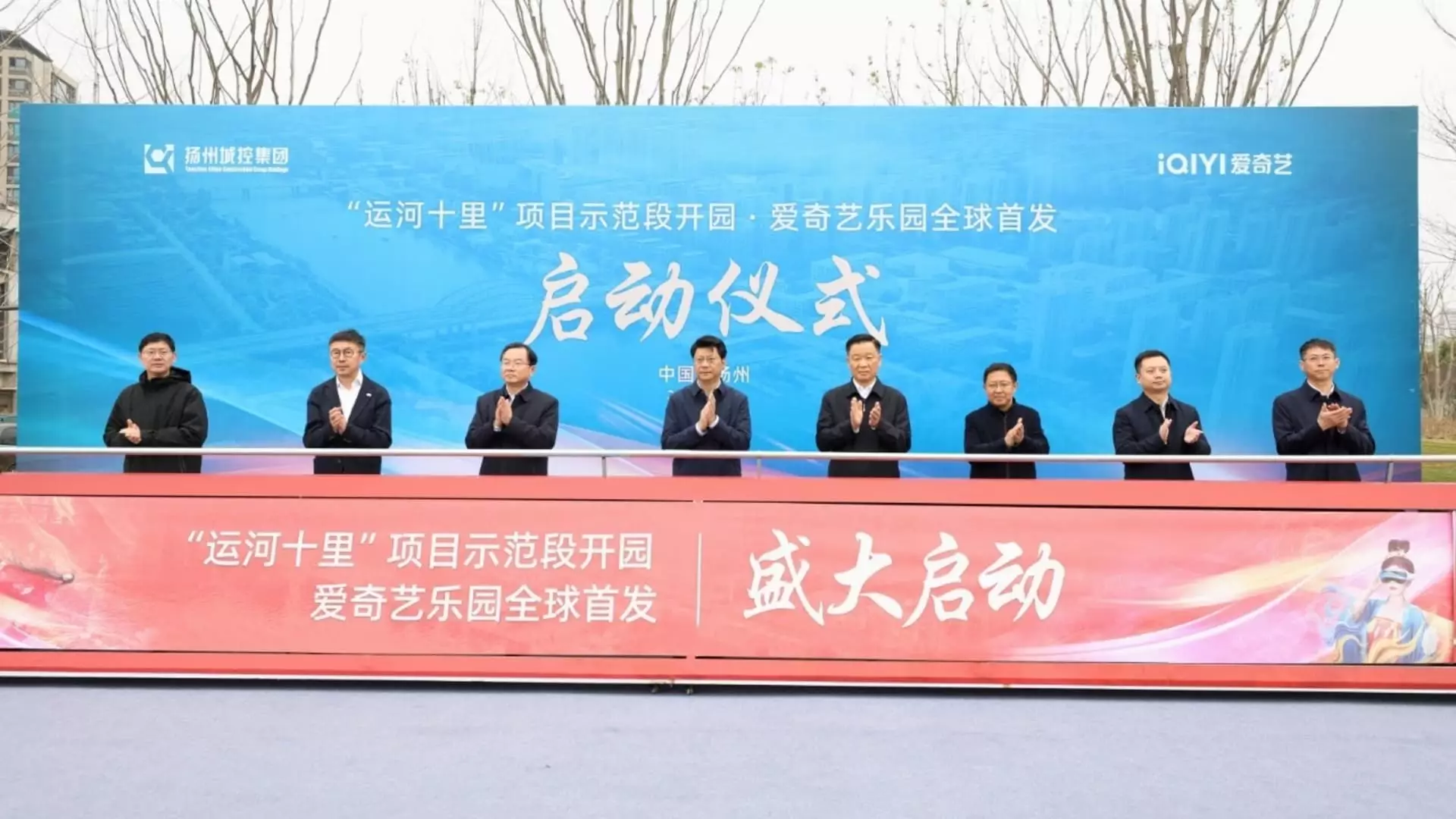In an audacious leap into the entertainment sector, Chinese video streaming giant iQiyi has announced plans for its first full-fledged theme park, “iQiyi Land,” set to open in Yangzhou, Jiangsu province, later this year. While the idea of a theme park rooted in beloved characters from its films and television dramas sounds exhilarating, the ambitious decision underscores the increasing trend towards experiential consumption in China. Yet, beneath this shiny facade lies a pressing question: can this ambitious theme park venture translate into success in a fiercely competitive market that has shown signs of consumer fatigue?
Whereas experiential consumption was once thought to hold the answer to rejuvenating retail sales—a strategy aimed at making shopping less about products and more about experiences—the cracks are starting to show. Increasingly, consumers are selective about how they spend their limited disposable incomes. With a staggering 480 billion yuan ($67 billion) anticipated in theme park revenue this year across mainland China, iQiyi faces mounting pressure to attract visitors amidst a concerning backdrop of stagnant consumption patterns nationwide.
Competition: The Rising Tide of Theme Parks
iQiyi’s announcement arrives in a landscape bursting with competition. Entertainment colossi like Disney and Comcast have established footholds in China, each with their own sprawling parks and global franchises. Disney’s Shanghai Disneyland, which has seen a staggering 28% year-on-year increase in operational income, serves as a precedent that could further accentuate the uphill battle iQiyi faces. The company is not just contending with an established audience but also vying for the attention of a generation fervently loyal to international brands.
Moreover, the surge of experiential attractions further complicates iQiyi’s position. The recent openness of other theme parks—such as the forthcoming Legoland in Shanghai—intensifies the competitive landscape, raising the bar for what consumers expect. The constant push for innovation in the form of advanced technology like VR creates a paradox; while it’s attractive, the give-and-take of financial accountability can loom ominously over every project.
The Dangers of VR: Uncertainty and Expectation
An intriguing facet of iQiyi’s new park is its heavy reliance on virtual reality (VR) technology to create immersive experiences. While the convergence of gaming and theater can breathe new life into entertainment, the palpable uncertainty surrounding VR also presents significant risks. Discussions surrounding authenticity versus artificiality loom large, especially in a culture that holds deeply rooted narratives in high esteem.
Moreover, there’s the question of infrastructure adaptability. Hang Zhang, iQiyi’s Senior Vice President, champions the concept of “distributed” theme parks—smaller, tech-centric spaces. Still, these pocket-sized attractions may operate under a misjudged assumption that consumers favor convenience over the grandeur of traditional theme parks. Can a smaller venue, leveraging technology for engagement, compete with the sprawling fantasies offered by their larger international counterparts?
The gamble becomes ever riskier when considering the forthcoming launch of initiatives like pop-up VR experiences initially reserved for iQiyi Land. While revolutionary in concept, a saturation of technology-driven entertainment can easily turn from cutting-edge to mundane.
Consumer Sentiment: Are They Ready for Change?
Chinese consumer behavior showcases a world at odds with itself. Despite tourism displaying an increase in spending amidst a lackluster economy, the average consumer is emerging warily. Enthusiasm for the “experience economy” collides with caution bred from economic stagnation, resulting in a paradox of heightened expectations versus dwindling wallets.
The very performance of iQiyi – with reported drops in revenues – suggests that public investment in entertainment may not be as robust as once assumed. Historically, iQiyi has partnered with local tourism boards and development agencies to produce engagement-driving content, such as a drama set radiating with local appeal. Yet, the robust numbers needed to justify immense investments in a theme park may not materialize so readily.
Local Identity versus Global Franchise: A Costly Balancing Act
As iQiyi weaves characters from its popular shows into the fabric of the new park, it must navigate the fine line of local identity versus the allure of global intellectual properties. While home-grown narratives resonate with a domestic audience, they risk being overshadowed by the dazzling array of internationally recognized franchises constantly demanding attention. There’s a risk associated with trying to “one-up” Disney and Warner Bros. while simultaneously cultivating a distinct brand identity worth celebrating.
As iQiyi attempts to build a unique theme park experience that combines domestic narratives with cutting-edge technology, it must confront the multilayered complexities of a market that both embraces change and clings to tradition. Without a discerning strategy to differentiate itself in this crowded arena, iQiyi may find itself swallowed up by giants that understand the delicate balance of nostalgia and innovation far better than it has thus far demonstrated.
Consumer fatigue in a dimly lit economic landscape may prove to be iQiyi’s most daunting opponent—one that can cast even the most brilliantly conceived visions into uncertainty.

